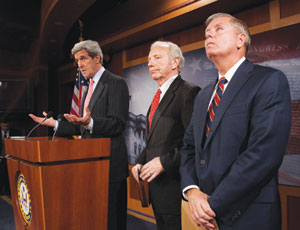Although a key Senate committee has cleared a sweeping climate-change bill, the measure faces a difficult road ahead. The Environment and Public Works Committee on Nov. 5 approved a measure, introduced by John Kerry (D-Mass.) and panel Chair Barbara Boxer (D-Calif.), by a 11-1 tally, with Republicans boycotting the vote. But a small group of lawmakers, including Kerry, is working behind the scenes to craft a more moderate bill that could garner bipartisan support. Some industry sources say that proposal may have better odds of clearing the full Senate. Still, with Congress focused on health-care reform and other fiscal issues, prospects for passing any bill by January are dim.

“It will be a tall order to get it done this year,” says Steve Hall, the American Council of Engineering Companies’ vice president for government affairs. But, Hall adds, observers are looking closely at efforts of Kerry and his colleagues Lindsey Graham (R-S.C.) and Joe Lieberman (I-Conn.) on a bill aimed at winning support of moderates like Max Baucus (Mont.), the lone Democrat to oppose the Kerry-Boxer plan in the Environment and Public Works (EPW) Committee.
The EPW-passed bill calls for a 20% reduction in greenhouse-gas emissions from 2005 levels by 2020. Along with that lower emissions cap, it would set up a system of tradable emissions allowances that could be acquired from entities that have cut their pollutant levels. The cap-and-trade bill the House approved in July would require a 17% cut. Republicans on the Senate panel, led by James Inhofe (Okla.), boycotted the three-day session to consider the bill.
Republicans said more analysis is needed before they can vote on the bill and that the Environmental Protection Agency is poised to carry out additional studies at their request. “Let EPA do its analysis so we can get to a markup—it’s really that simple,” implored Inhofe, who made a brief appearance at the markup. Boxer countered that extensive study had already been done and said, “Another EPA analysis now would be duplicative and a waste of taxpayer dollars.”
Kerry, Lieberman and Graham now have started work on a possible new bill, which they say probably would add incentives for nuclear power projects and ease restrictions on offshore oil and gas drilling.
Those additions would be welcome, says Karen Lapsevic, the Associated General Contractors’ director of tax, fiscal affairs and infrastructure finance. But AGC remains concerned about any bill that does not include the House version’s pre-emptions of the Clean Air Act. Under the EPW-approved bill, EPA regulation of greenhouse gases under the new source-review program could still move forward, creating a “double whammy” for industrial emitters. “Not only would they be covered under the cap-and-trade program, but they also might have to get pre-construction permits and operating permits under the Clean Air Act, which would add to the cost…and delay work for our members,” Lapsevic says.
Construction groups also don’t like provisions in the Senate committee bill that would require EPA and the Dept. of Transportation to approve state and metropolitan greenhouse-gas reduction plans. Organizations such as the American Road and Transportation Builders Association and the National Stone, Sand and Gravel Association say inserting an additional federal agency into the approval process could add to delays on transportation projects.
Environmental groups hope the Senate committee vote was a step toward enacting a climate-change measure. “Nobody expected the EPW [panel] to act so quickly on a bill,” says Justin Tatham, the Audubon Society’s assistant director of government relations. Whether legislation ultimately passes this year or not, Tatham says, “We still see forward momentum on the issue, and that’s what we’re most focused on at this point.”


Post a comment to this article
Report Abusive Comment